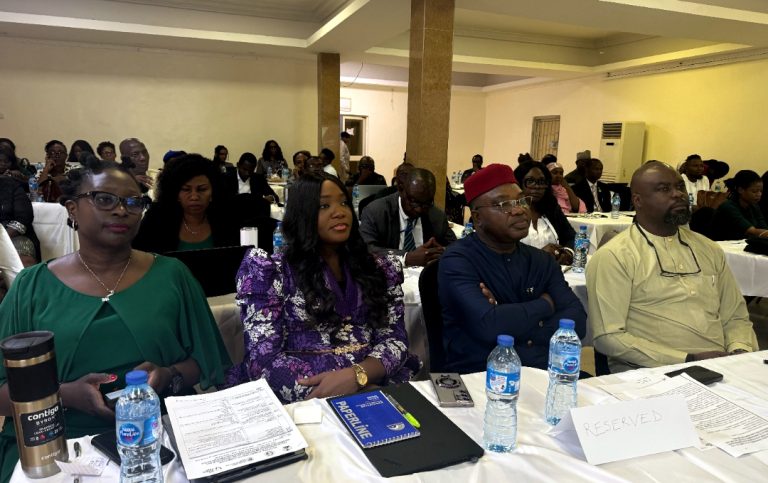
Health experts, rights advocates, and other stakeholders from across various parts of the country are gathering in Lagos for a 3-day meeting to review strategies and metrics for the implementation of the HIV/AIDS anti-discrimination act 2014. The law which is targeted at addressing the discrimination of persons living with HIV/AIDS in different strata of society is a demonstration of ‘Nigeria’s commitment to ending the stigma and discrimination associated with HIV’, the Executive Secretary/CEO of the National Human Rights Commission (NHRC), Dr. Tony Ojukwu stated as he declared the conference open today Wednesday 23rd April 2025. The stakeholders’ meeting is themed Promoting Legal, Policy, and Institutional Protection of the Rights of Key and Vulnerable Populations in Nigeria.
The Executive Secretary/CEO of the National Human Rights Commission (NHRC), Dr. Tony Ojukwu in his address cited about the 2014 Act. ‘The HIV and AIDS Anti-Discrimination Act of 2014 is a landmark piece of legislation that underscores Nigeria’s commitment to ending the stigma and discrimination associated with HIV. The Act prohibits discrimination on the basis of HIV status in employment, education, healthcare, and other spheres of public life. It guarantees the rights of people living with HIV to privacy, access to justice, and protection from abuse.’
‘The Act has inspired state-level legislations offering similar protections to persons living and affected by HIV/AIDS. However, despite the progress made since the passage of this Act, implementation gaps remain, and challenges persist at various levels—from awareness and understanding of the law to enforcement and access to remedies for victims of discrimination. From workplaces to access to health services, and educational and religious settings have seen discrimination of various kinds violating the rights of persons living with and affected by HIV/AIDS.’
He encouraged the conference attendees to ‘Review the current status of implementation of the HIV and AIDS Anti-Discrimination Act; Identify gaps in awareness, enforcement, and access to justice; Assess and identify legislative gaps within the Act itself and propose necessary amendments to make the law more robust, inclusive, and impactful; Design strategies to strengthen institutional responses and improve protection mechanisms for victims of discrimination; And most importantly, to galvanize support and commitment from all sectors to ensure that the promise of the 2014 Act becomes a reality for every Nigerian affected by HIV.’
‘This forum also seeks to enhance cross-sector collaboration, recognizing that human rights protection in the context of health cannot be achieved in isolation. We must continue to work with the Ministries of Health, Justice, Labour, and Education, the National and State Agencies on AIDS as well as civil society and development partners, to build a holistic and sustainable framework that upholds the rights and dignity of all people. Your insights and recommendations over the course of this meeting will be pivotal in informing the Commission’s future programs and national advocacy. Our goal is to develop a comprehensive action plan that addresses both the structural barriers and legal shortcomings, and that paves the way for inclusive, rights-respecting policies and practices’, Ojukwu remarked.
Another speaker at the first day of event, Deputy Director, Community Prevention and Cure Service and Head Gender and Human Rights Department, NACA, Dr. Chukuwgozie Ujam indicated that Nigeria has made tangible progress in the journey since HIV was first discovered in the early 80s as the country started treatment programs for persons living with HIV in 1986 but rued the misinformation which is still out there about the scourge. He, however, warned ‘while HIV is managed well, AIDS is largely controlled and the prevalence rate has fallen, people have started becoming careless. So we want to sustain the message out there about abstinence, protection or prevention measures. We want people to continue testing because we haven’t tested everybody who is potentially living with the virus.’
On the halt in support by USAID embarked upon by Pres. Donald Trump, the NACA deputy director said: ‘The United States has coughed and we’ve all caught the cold. So there are certain proclamations that have been made, but as a country we’ve been able to say that we are responsible for our brothers and sisters. You may not be infected by the virus, but you’re well affected by the virus. So what we need to do is to ensure that there’s no break in the treatment program. The Ministry of Health has brought out a significant amount of money to ensure that not just HIV but even for malaria and TB to ensure that the treatment programs for these important people in our country can continue.’